|
Welcome to Our February Newsletter
We also commend our seven
Honorable Mentions—Cynthia
Harris-Allen, Imani
Josey, Robbi
Pounds, Robin
Reardon, Patricia
Rohner, D.B.
Sieders, and Michael
H. Ward, and six Finalists—Arjay Lewis, Susan Harrison
Rashid, Steven Schlozman, Vanda, Doug Piotter, and Susan Tereba. Judges
Jendi Reiter and Ellen LaFleche reviewed 378 entries, assisted by
Lauren Singer and Annie Keithline. We awarded $6,250 in all. Please
read excerpts from our winners' outstanding books, with critiques by
the judges and advice for future contestants. See the
press release about the winners.
Our new competition opens
today, with a deadline of June 30. We are increasing the prize pool to $9,250,
including a new top prize of $3,000. By popular request, we are adding
categories for Poetry and Children's
Picture Book. The other categories are
Mainstream/Literary Fiction, Genre Fiction, and Creative Nonfiction
& Memoir. ENTER
HERE.
In this issue: Please enjoy "I Have Come To Consume The
World", illustrated by Julian Peters.
|
|
Sign
up today and you'll...
·
Learn from feedback that will be
written on everything you write. Share your poetry, stories and book
chapters.
·
Be a part of a community
for writers of all skill levels. Make connections and
friends.
Upcoming contest deadlines:
5-7-5 Valentine
Poetry Contest
Submit a three-line poem with a 5-7-5 syllable pattern. Write about
anything that will warm the heart of that special someone or perhaps
the opposite approach to that Valentine you'd rather forget. Cash
prize. Deadline: February 16 (tomorrow!)
Rhyming Poem
Contest
Write a poem of any type, but there must be a rhyme schme. The
winner receives a cash prize. Deadline: February 18 (in
three days!)
5-7-5 Poetry
Contest
These poems follow the structure of haiku (three lines, 5-7-5 syllable
pattern) but without any limits on the subject. Win
cash. Deadline: February 19 (in
four days!)
100-Word Flash
Fiction
A drabble is a flash fiction story that uses around 100 words. Write a
drabble on any topic using 98-102 words. Cash for the winner.
Deadline: February 26.
|
Congratulations to Francine
Witte (featured poem: "Charley
Says Give Me Your Heart"), Robert
Walton, James W. Gaynor, Scott
Winkler, Sheryl Clough (featured
poem: "Night
Fire"), Jill Hoffman, Gary
Beck, Mary Freericks, Nancy
Louise Lewis, Terry Hynes, Mike
Tuohy, J.C. Todd, Kathleen
Spivack, Rick Lupert, and Diane
Frank.
|
The Launch Pad Competitions are
dedicated to giving writers the exposure they need to launch
professional Hollywood careers. That's why in just 5 years the Launch
Pad has helped over 254 writers land representation with top agents and
managers, 81 writers set up projects, 45 writers earn staff writing
jobs and sparked 4 bidding wars from major Hollywood studios. Our 2018
pilot competition is currently underway so enter today to
have your work seen by companies that include CAA, Verve, Anonymous
Content, Chernin Entertainment, and many more.
|
Deadline: February 26
Seeking altered states might be
one of the oldest human hobbies—for better and for worse—and we're
looking for stories that capture the widest possible range of
experiences and voices. Whether you (or someone else) were tipsy or
wasted, soooooooo drunk or just a little high—on life, or love, or
power, or something else—we want to hear your story about being under
the influence.
As always, we're interested in
stories that are more than mere anecdotes, and we love work that
incorporates an element of research and/or makes a connection to a
larger story or theme. We welcome personal stories as well as profiles,
and above all, we are looking for narratives—true stories, rich with
scene, character, detail, and a distinctive voice—that offer a fresh
interpretation or unique insight into the theme.
If we're being honest, we're
also especially hoping for some happy (or at least lighthearted, if not
downright funny) stories—a mix of uppers and downers, as it were.
CNF editors will award $1,000 for best essay and $500 for
runner-up. All essays submitted will be considered for publication.
|
|
|
Deadline:
February 28 (postmark or online submission-date)
Final Judge: Eduardo C. Corral
The Snowbound Chapbook Award
includes a cash award of $1,000, publication by Tupelo Press, 25 copies
of your book, a book launch, and national distribution with energetic
publicity and promotion. All finalists will be considered for
publication. Results announced in late spring 2018.
The Snowbound Chapbook Award is
open to anyone writing in the English language, whether living in the
United States or abroad. Translations are not eligible for this prize,
nor are previously self-published books. The contest is competitive.
Simultaneous submissions to other publishers or contests are permitted;
notify Tupelo Press promptly if your manuscript is accepted elsewhere.
Submit a previously
unpublished, chapbook-length poetry manuscript (20-36 pages) with a
table of contents and, if applicable, an acknowledgments page for poems
previously published in periodicals. We encourage online submission via
our Submittable system. You may also submit via postal mail:
Tupelo Press Snowbound Prize
PO Box 1767
North Adams, MA 01247
For mailed manuscripts, request
notification of receipt by including a SASP. For notification of the
winner, enclose a SASE. Manuscripts will not be returned.
A reading fee of $25 payable by
check to Tupelo Press or via Submittable must accompany each submission.
Multiple submissions are accepted, each accompanied by a $25 reading
fee.
Please enjoy this selection by Allan
Peterson, author of Other Than They Seem (Tupelo
Press, 2016) and winner of the 2014 Snowbound Chapbook Award, selected
by Ruth Ellen Kocher.
Longing
by Allan Peterson
Point to the longing they said
and I touched a map
of the whole body
the ulnar
radial that which draws tears
from fingers after touch
the words soothing and lying at
the same time
cloudburst sunrise
a whiteness like a bone and
then your picture
|
|
|
|
Deadline: March 30
We want to receive your
freshly-inspired, thought-provoking, and compelling essay describing
what life would be like if we didn't have the arts &
entertainment. 100 words minimum. 500 words maximum.
Prizes: 1st
Place $500 and publication on our website along with
winner's photo and bio; 2nd Place $100 and name
listed on our website; 3rd Place $50 and name
listed on our website; Honorable Mentions will have their names listed
on our website.
$8 entry fee. Sponsored by
Divine Connections Special Events. Contest open to all writers 18 years
and older who are legal residents of the United States of America. Void
where prohibited.
|
"I like to listen. I'm
much more interested in listening than speaking, for sure."
—Final Judge Gish Jen,
whom Junot Diaz calls "the Great American Novelist we're always
hearing about..."
Deadline: March 31. Submit
unpublished short stories and creative nonfiction pieces no longer than
7,000 words. Entry fee: $17.
Winner receives:
·
$1,000 prize
·
Publication online and in the
print issue of COG
·
A blurb about your short story
by Gish Jen
·
Your story adapted as an
animated short film, 2D animation, graphic novel, or series of
interpretive illustrations by students in Cogswell College's celebrated
Digital Art & Animation and Digital Audio Technology programs.
|
|
|
|
Deadline: April 15
Now in its 25th year, all
Dancing Poetry Festival prize winners will receive a prize certificate
suitable for framing, a ticket to the 2018 Dancing Poetry Festival in
the Florence Gould Theater at the California Palace of the Legion of
Honor, San Francisco, and an invitation to read their prizewinning poem
at the festival.
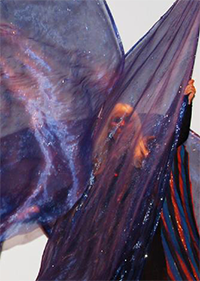 Three Grand Prizes will receive $100 each plus their
poems will be danced and filmed. Many smaller prizes. Each Grand Prize winner will be
invited onstage for photo ops with the dancers and a bow in the
limelight. Three Grand Prizes will receive $100 each plus their
poems will be danced and filmed. Many smaller prizes. Each Grand Prize winner will be
invited onstage for photo ops with the dancers and a bow in the
limelight.
|
Deadline: May 21
They say it's where you hang
your hat; it's where the heart is; it's where they have to take you in.
But what does home mean for communities and individuals facing rising
temperatures and extreme weather; wealth disparity and resource
scarcity; and the forces of globalization and nationalism? What does it
mean to belong somewhere? For the winter 2019 issue of Creative
Nonfiction magazine, we're looking for true stories about
finding—or, perhaps, coming to terms with losing—your place in the
world.
As always, we're interested in
stories that are more than mere anecdotes, and we love work that
incorporates an element of research and/or makes a connection to a
larger story or theme. We welcome personal stories as well as profiles,
and above all, we are looking for narratives—true stories, rich with
scene, character, detail, and a distinctive voice—that offer a fresh
interpretation or unique insight into the theme.
All essays submitted will be
considered for publication; this is a paying market.
|
|
|
Deadline: July 16
For the spring 2019 issue of Creative
Nonfiction magazine, we're looking for true stories about
doing it. Whether you're straight, gay, or other; alone, in a couple,
or in a crowd; doing it for the first time or the last, or not doing it
at all, we want to hear your story.
As always, we're interested in stories
that are more than mere anecdotes, and we love work that incorporates
an element of research and/or makes a connection to a larger story or
theme. We welcome personal stories as well as profiles, and above all,
we are looking for narratives—true stories, rich with scene, character,
detail, and a distinctive voice—that offer a fresh interpretation or
unique insight into the theme.
Please note: for this issue, we
are interested primarily (and perhaps even exclusively) in stories of
consensual and/or victimless sex. Also note, we are not seeking
erotica. No photos, please.
Creative Nonfiction editors will award $1,000 for Best Essay and $500
for runner-up. All essays will be considered for publication.
|
|
|
Jendi Reiter's debut novel Two Natures
(Saddle Road Press, 2016) is a finalist for the 2018
EPIC eBook Awards in the Contemporary Fiction category.
Winners will be announced in March. Since 1998, EPIC, the Electronic
Publishing Industry Coalition, has supported independent authors and
publishing professionals through workshops, conferences, and annual
competitions for the best e-books in a variety of fiction and
nonfiction genres.
Set in New York City in the
early 1990s, Two Natures is the coming-of-age story of Julian
Selkirk, a fashion photographer who struggles to reconcile his Southern
Baptist upbringing with his love for other men.
·
2016 Rainbow Awards: First
Prize, Best Gay Contemporary Fiction; First Runner-Up, Debut Gay Book
·
Named one of QSpirit's Top
LGBTQ Christian Books of 2016
·
2016 Lascaux Prize in Fiction
Finalist
·
2017 National Indie Excellence
Award Finalist
·
2017 Book Excellence Awards
Finalist
"Jendi
Reiter has delivered a complex, nuanced, heartbreaking, and
intellectually engaging novel about life in the 90s for the gay man,
along with a wittily scathing putdown of the fashion industry and its
fragile pretentious foibles."
—Goodreads 5-star review by Sandra
Hunter, author of Trip Wires (Leapfrog Press,
2018)
|
|
Some contests are best suited
to writers at the early stages of their careers. Others are better for
writers with numerous prizes and publications to their credit. Here is
this month's selection of Spotlight Contests for your consideration:
Emerging Writers
Restless
Books Prize for New Immigrant Writing.
$10,000 advance and publication in print and ebook editions for
literary fiction, 45,000 words minimum, by a first-generation immigrant
of their country who has not previously published a book in that
particular genre with a US publisher. "First-generation" can
refer either to people born in another country who relocated, or to
residents of a country whose parents were born elsewhere. Due February
28.
Intermediate Writers
Judith
A. Markowitz Award for Emerging LGBTQ Writers.
Two prizes of $1,000 each for LGBTQ authors who have published 1-2
books of fiction, nonfiction, or poetry. Candidates' contributions to
the LGBTQ literary field beyond their writings and publications will
also be considered. Due February 20.
Advanced Writers
Lewis Galantiere
Award. The American Translators Association
awards $1,000 for a distinguished book-length literary translation from
any language, except German, into English. Entries must have been
published in the US in the past two years (in 2016 or 2017 for the 2018
contest), and authors should be US citizens or permanent residents. Due
March 1.
|
|
|
·
Seshat
(writing by homeschoolers - February 15)
|
|
There are 36 million adults in
the United States who can't read above a third-grade level. That means
the likelihood of meeting someone who struggles to read is truly
staggering.
And while one in seven American
adults struggle to read, you wouldn't know it. Most of these adults
find creative ways to hide their reading issues because of their own
embarrassment. For example, someone might ask for help reading
something saying they "forgot their glasses". Or at a
restaurant, unable to read the menu, they might ask the waitress what
she recommends. And contrary to popular belief, the majority of these
people are very smart. I have met a successful business owner who went
through most of his life without being functionally literate. I have
heard stories about a truck driver making deliveries by following
landmarks, business owners having their spouse sign documents, and
parents pretending to read to their children by making up stories from
the pictures in a book.
Here are just some of the
issues people who are unable to read deal with on a daily basis:
1.
Worrying if they are giving
their children the right dose of medicine.
2.
Unable to fill out a job
application.
3.
Hiding their low literacy from
their employer.
5.
Memorizing products so they can
find them at the store.
6.
Making excuses to avoid
activities that might involve reading.
ProLiteracy promotes adult
literacy through content development, programs, and advocacy. Our goal
is to help literacy programs increase the quantity and quality of
services provided. Learn
more.
|
|
We send this newsletter to over
50,000 subscribers. Ads are just $150 each. On a tight budget? Pressed
for time? Advertise to our 104,000 Twitter followers for just $40 per
tweet or less.
|
|
In Chapter 11 of the Hindu
scripture the Bhagavad Gita, Krishna reveals
himself to the warrior hero Arjuna in his full nature as the transcendent
and immanent Lord of the Universe. This watercolour painting is
inspired by the portion of this cosmic vision in which Arjuna describes
the God's terrifying appearance in the role of destroyer (being all
things, Krishna is also the destruction of all things):
"O Vishnu [Krishna is the
avatar or embodiment of Vishnu], I can see your eyes shining; with open
mouth, you glitter in an array of colours, and your body touches the
sky. I look at you and my heart trembles; I have lost all courage and
all peace of mind.
"When I see your mouths
with their fearful teeth, mouths burning like the fires at the end of
time, I forget where I am and I have no place to go. O Lord, you are
the support of the universe; have mercy on me!
"I see all the sons of
Dritarashtra; I see Bhishma, Drona, and Karna; I see our warriors and
all the kings who are here to fight. All are rushing into your awful
jaws; I see some of them crushed by your teeth. As rivers flow into the
ocean, all the warriors of this world are passing into your fiery jaws;
all creatures rush to their destruction like moths into a flame.
"You lap the worlds into
your burning mouths and swallow them. Filled with your terrible
radiance, O Vishnu, the whole of creation bursts into flames.
"Tell me who you are, O Lord
of terrible form. I bow before you; have mercy! I want to know who you
are, you who existed before all creation. Your nature and workings
confound me."
To this Krishna gives the
hair-raising reply:
"I am time, the destroyer
of all; I have come to consume the world."
The cited passages are from the
translation of the Bhagavad
Gita by Eknath Easwaran (Nilgiri Press, 1985). Artwork by
Julian Peters. See more
at Mr. Peters' website.
|
Decolonizing
With My Polish Jewish Ancestors
Polish indigenous magic and folk traditions come from the land where my
ancestors lived, but do they come from my people?... Judaism,
meanwhile, defined itself from the beginning as opposing all forms of
folk magic or worship of local spirits. Tearing down pagan altars was a
full-time job for the Hebrew prophets. I feel a stronger connection to
Jewish material culture and traditions–folk tales, family rituals,
recipes, Yiddish songs, immigrant narratives–than to anything Polish.
This is the actual heritage of my biological relatives. To the extent
that I have any experience of inter-generational oral tradition, this
is it. However, the religion is inherently contrary to the witchy
project into which I would pour these memories. [read more]
|
|
|
|
|
|
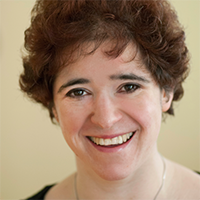
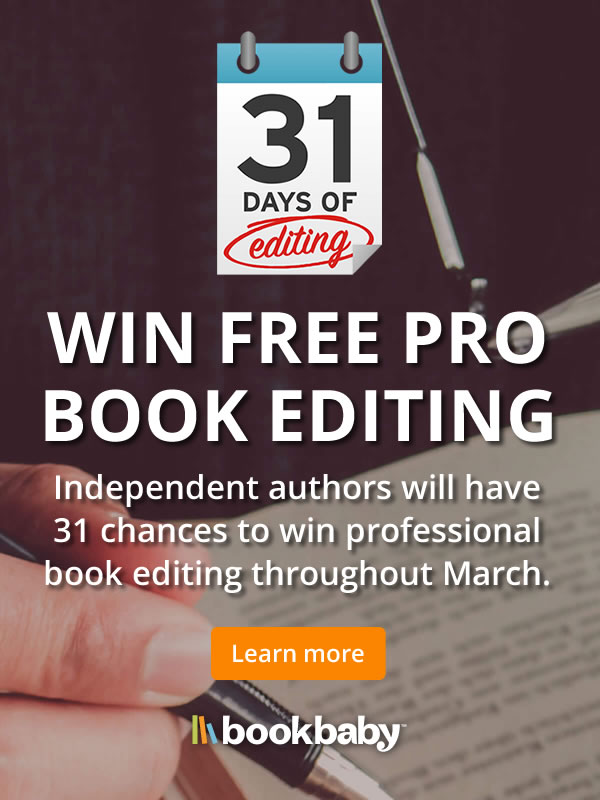

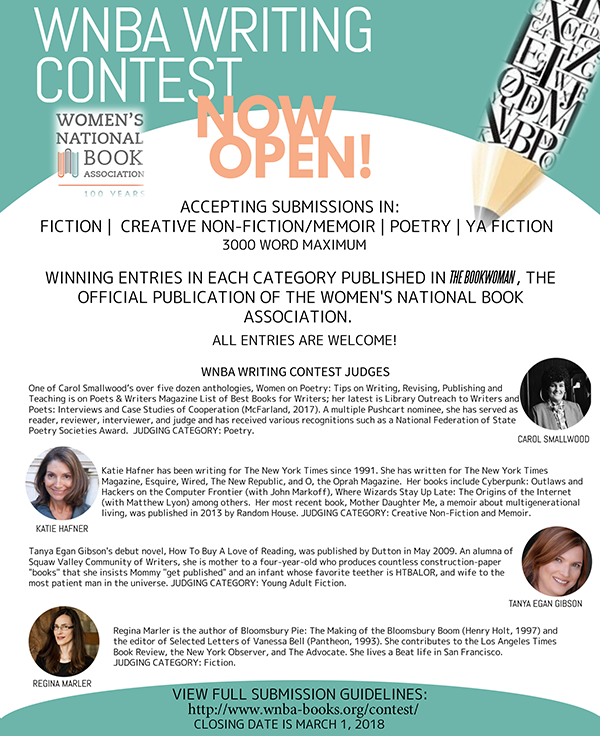
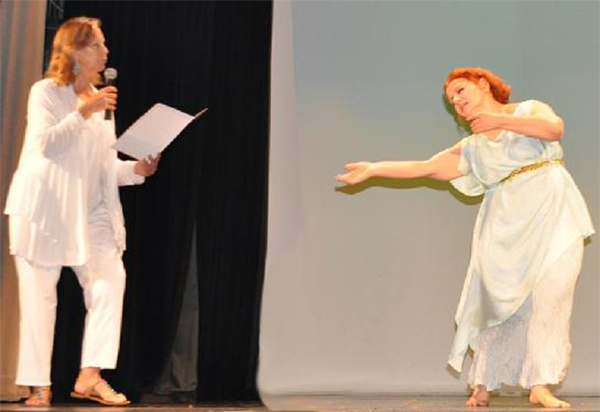
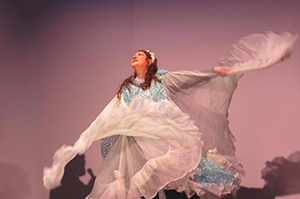
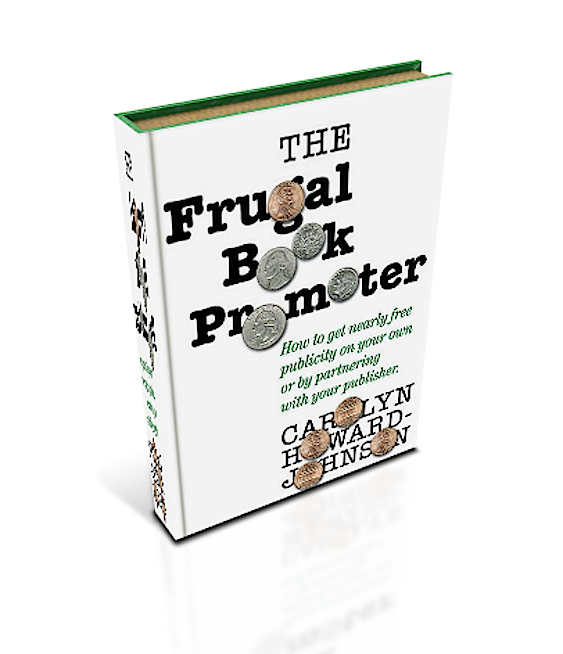
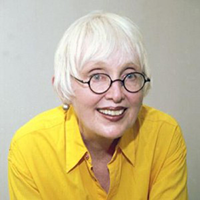
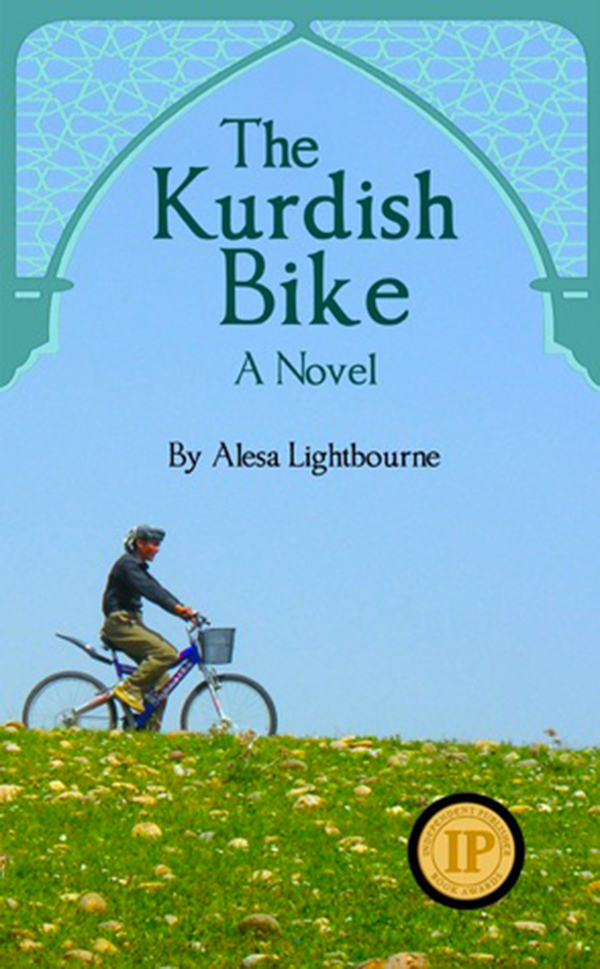
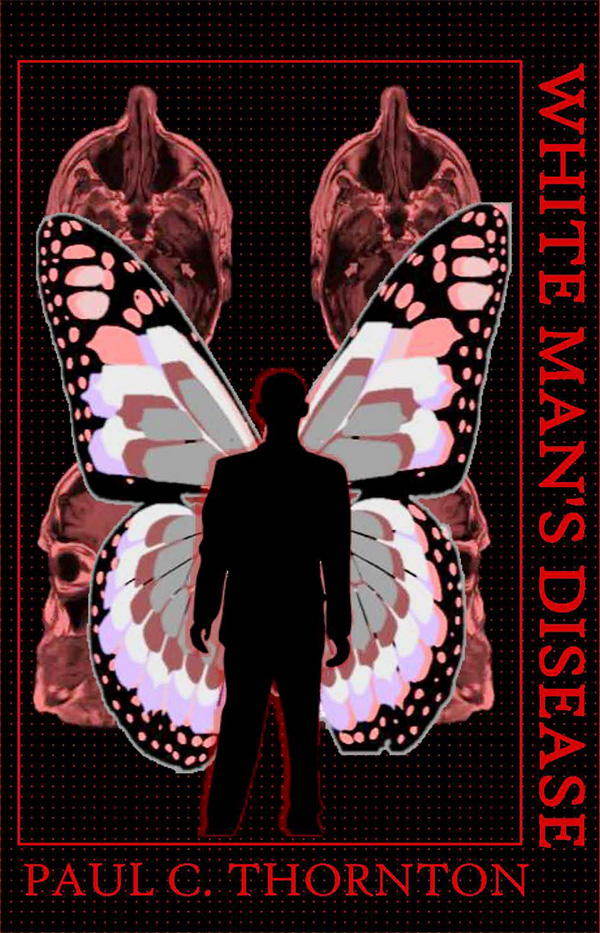
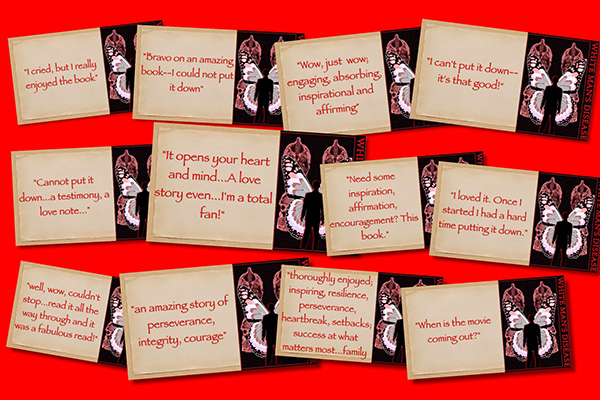
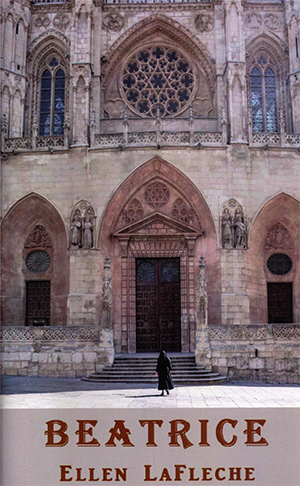
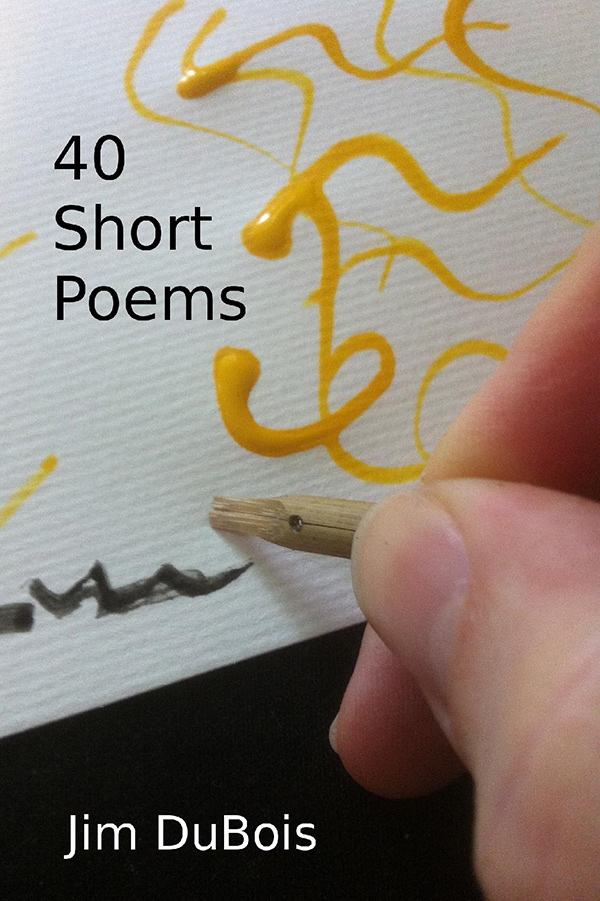
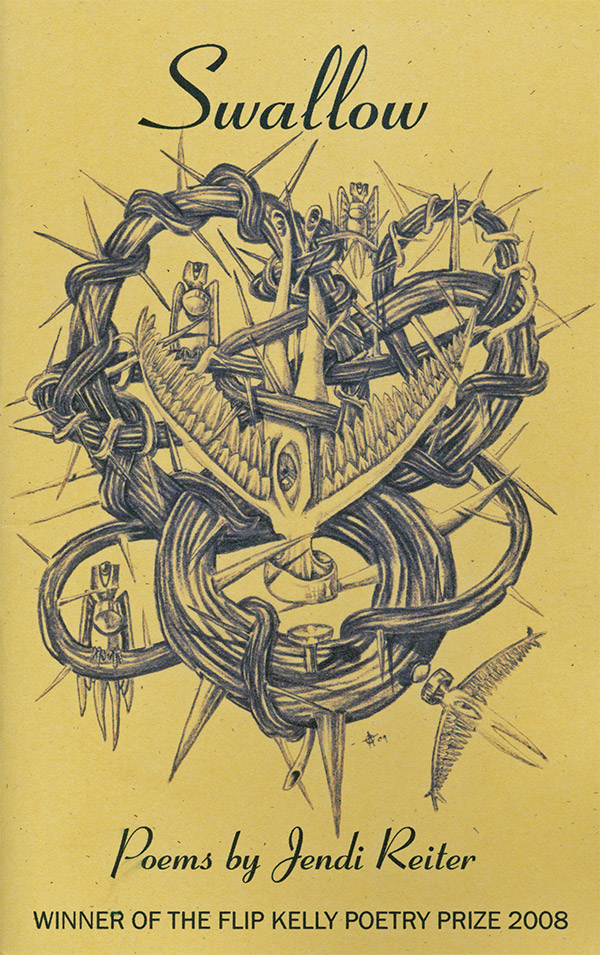
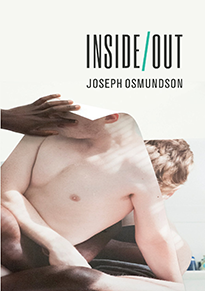
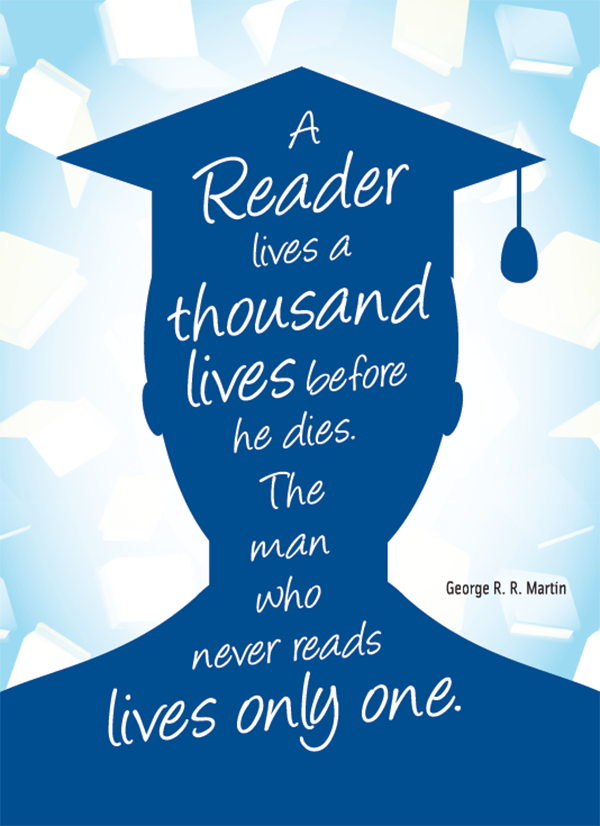

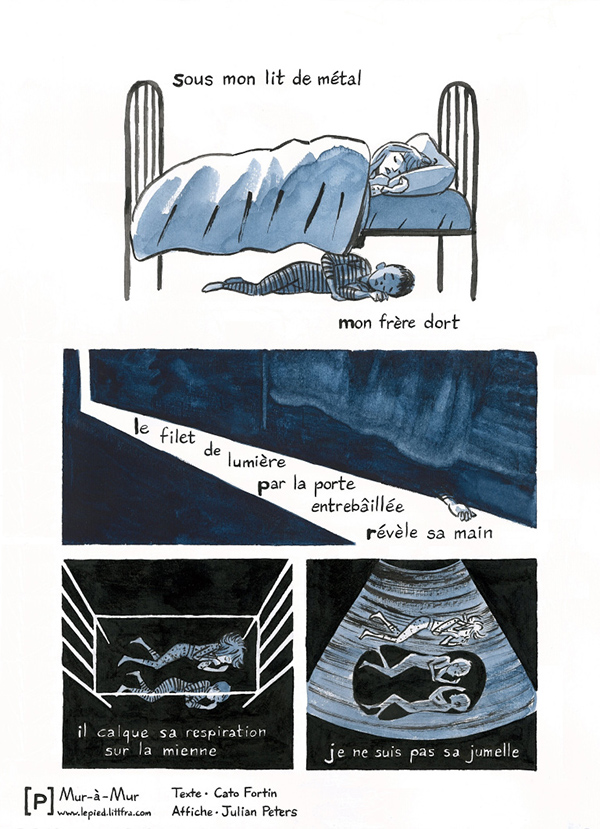



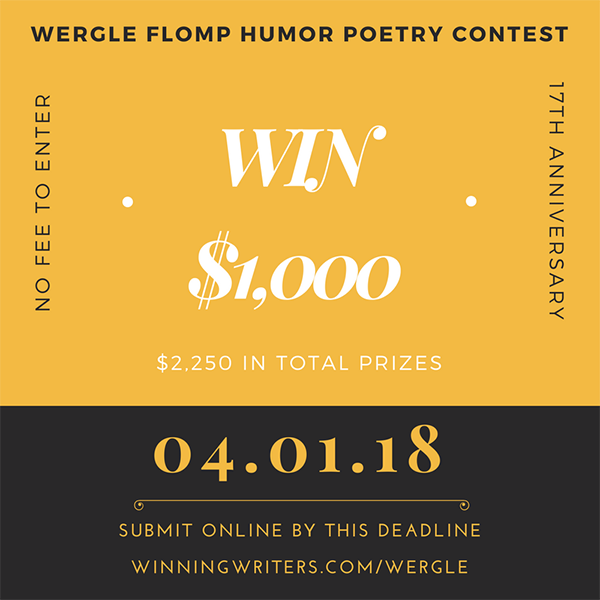
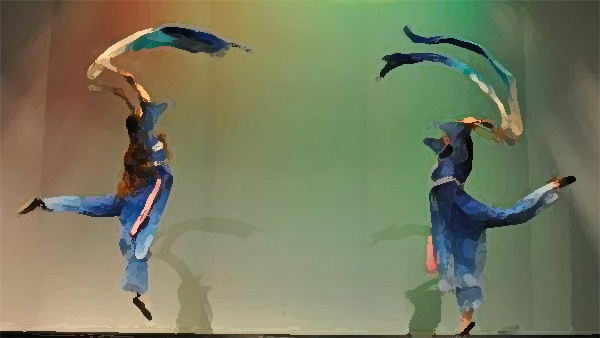
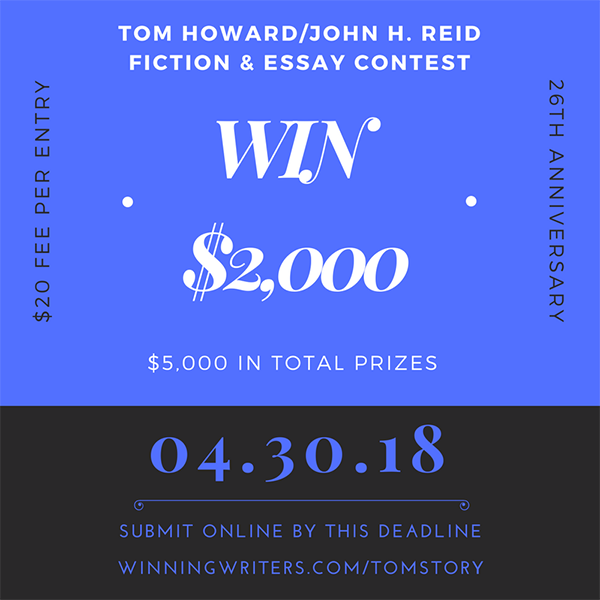
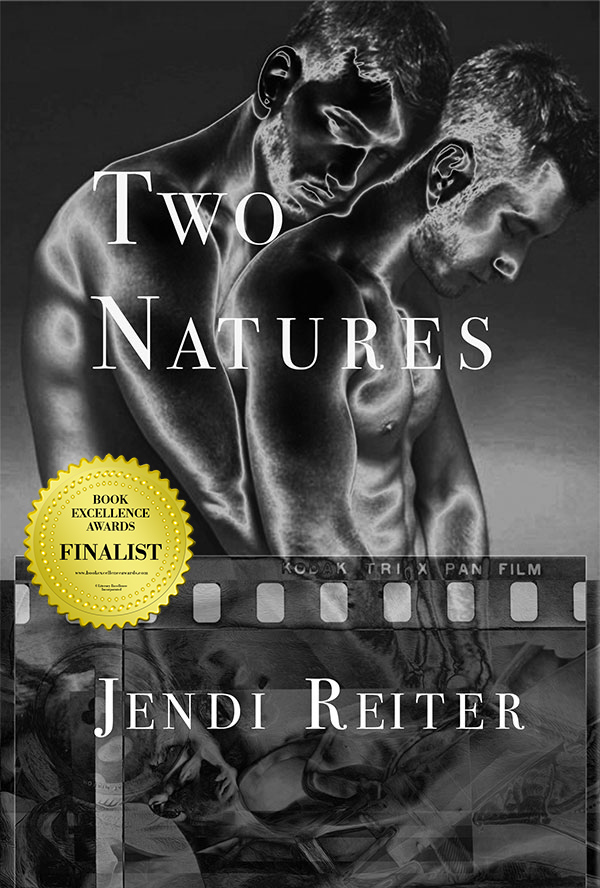
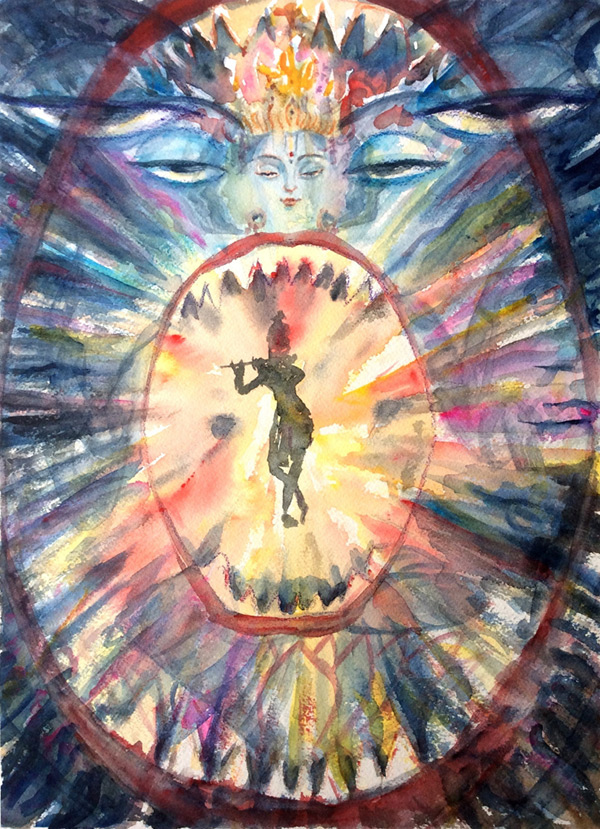

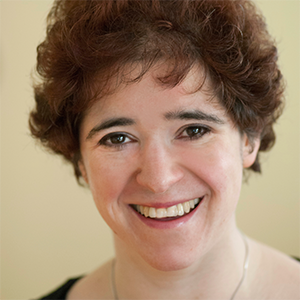
No comments:
Post a Comment